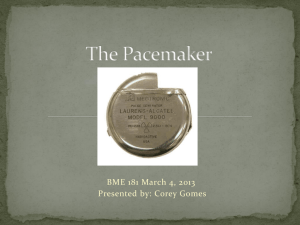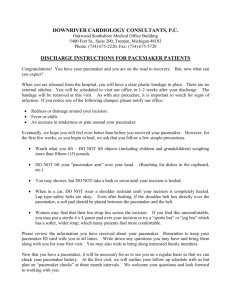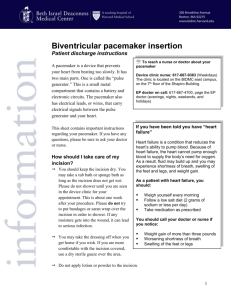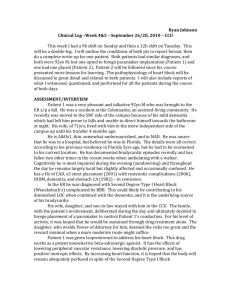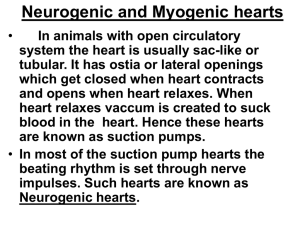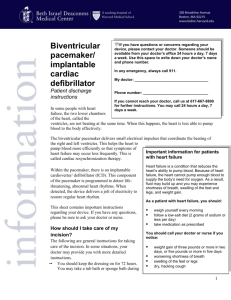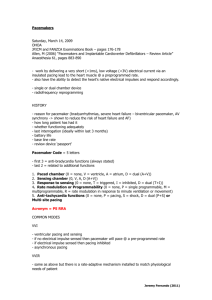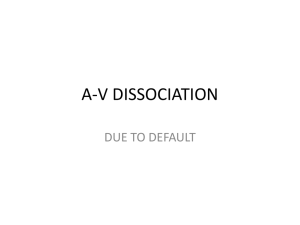Heart Physiology and the Pacemaker (Comparison of voltage
advertisement
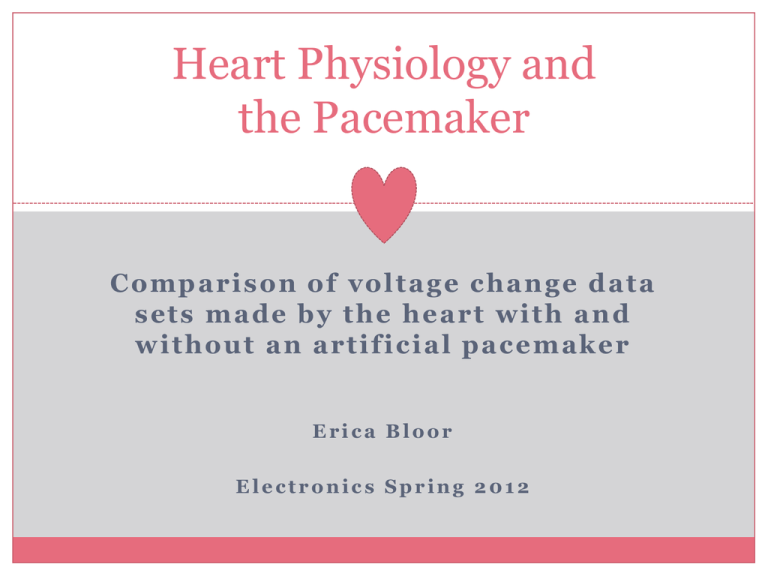
Heart Physiology and the Pacemaker Comparison of voltage change data sets made by the heart with and without an artificial pacemaker Erica Bloor Electronics Spring 2012 Purpose for Research Research: ● Manipulating program of a heart’s pulse by varying: Cell location Cell connectivity Number of broken cells Cases with an artificial pacemaker Purpose: ● Compare pulses of heart cells with and without an artificial pacemaker See how natural pacemakers cells work See how an artificial pacemaker affects the heartbeat ● Results can be used to better understand voltage changes in various sections of the heart with or without broken cells in order to see if an artificial pacemaker would be needed. The Heartbeat The heartbeat: ● Electrical current flow makes the muscles contract Pacemaker cells (Sinus Node) ● Cells that specialize in generating electricity ● Changing charge from positive to negative and back by Potassium – Calcium channels “Chain Reaction” of electric charge ● Cardiac cell’s capability RC Circuit Motion of the heart is like an RC circuit: dVi (t ) 1 C Vi (t ) g i (t )[Vi (t ) Ek ] I i (t ) dt R C: capacitance V: potential of cell i at time t R: resistance I: external current to cell i, at time t Charging and discharging Real vs. Model Heart Real Heart Model Heart The data collected is likely to be different from other data from a real heart because of the shape difference in plots. Voltage Change Comparison Created plot (mili-second vs. mV) of [odd, even] cells in heart plot Comparison of rows 1, 3, 5, 7, and 9 Connectivity How well the heart cells “pass along” current Like the conductance of a circuit Changed connectivity from 0.54 to 0.24 and 0.84 ● Broken Cells Damaged cells that may affect the efficiency of the heart Looked at surround cells before and after damage ● [3, 5], [5, 2], [8,8] Broken Pacemaker Cells If the pacemaker cells are broken along with the other 3 broken cells, the heart will beat slowly and erratically. Artificial Pacemaker Case 1: Artificial pacemaker will aid in the pulsation of the heart. Case 2: A Chaotic fluctuation added to the artificial pacemaker will aid in the pulsation of the heart. (Addition) In the program there is a parameter for chaos, labeled “ka.” It is set to 1.50. This could be changed depending on the amount of chaotic fluctuation needed by the recipient. Artificial Pacemaker An artificial pacemaker is needed when the heart beat is abnormally slow or rapid and erratic. ● Damage from a heart attack, high blood pressure, and too much alcohol can lead to a lack of oxygen to the heart. When the heart is strained, the flow of electrical signal is disrupted. ● Diseases: Bradycardia Atrial Fibrillation Heart Failure Syncope Conclusions Heart cells function like RC circuit. Broken cells (whether pacemaker or other heart cells) affect the flow of current through heart, impacting the heart’s pulse. Pacemakers do not cause the sinus node to create current, but aid in the time period of the pulse. References “How the Normal Heart Works” http://www.chop.edu/service/cardiac-center/heart-conditions/how-the-normal-heartworks.html “Improving the beat of heart failure” http://www.health.harvard.edu/newsweek/Improving_the_beat_for_heart_failure.htm “Pacemaker” http://www.heartonline.org/pacemaker.htm “Pacemakers” http://www.hrsonline.org/patientinfo/treatments/pacemaker/ “The electrocardiogram – looking at the heart of electricity” http://www.nobelprize.org/educational/medicine/ecg/ecg-readmore.html “The Normal Heart” http://www.hrsonline.org/PatientInfo/TheNormalHeart/ “The Virtual Heart” http://thevirtualheart.org/
